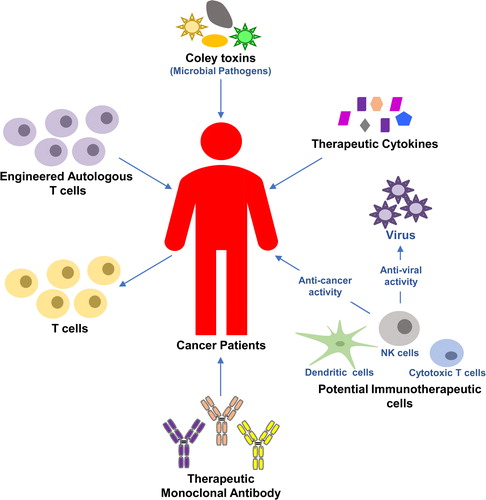Immunotherapy means tailoring the host immune responses using exogeneous or endogenous immune or non-immune cells/molecules to defend against various diseases. It was originally established by Onco-surgeon William Coley in 1890. He prepared a substance known as Coley’s toxin, which consists of various kinds of heat killed bacteria. Later, he used this cocktail of toxins to treat various cancers. However, the lack of underlining molecular mechanisms made it less convincing among the scientific community over traditional cancer therapy. Various immunotherapeutic agents were used such as cytokines (Interferons), monoclonal antibodies, check point inhibitors, therapeutic viruses, and adoptive transfers of engineered or normal cells. The precise action of the immunotherapeutic agents makes it a most promising therapeutic agent to treat complex diseases. However, the cost of these agents is reasonably high, which hinders wider use in the patients. Recently, due to better fundamental understanding of cellular processes and improved molecular biology tools for genetic manipulations, the development of immunotherapeutic agents are cost effective and have relatively less side effects. Cancer is a multifactorial disease where immunity is dysregulated and unable to eliminate cancerous cells expressing a modified self. This issue of International Reviews of Immunology focuses on the rewiring of host immunity by simple and/or complex molecules or cells to eliminate tumor or cancer. This issue also discusses how the innate immune cell plays a crucial role against cancer and during virus infection ().
Cancer is a noninfectious disease that is not only associated with humans but also associated with various animals, except naked mole rats who are known to be resistant from cancer. The host immune system plays a crucial role in controlling transformed cells by developing appropriate immune responses through recruiting various innate and adaptive immune cells, although the cancerous cells dampen the host immune responses. Therefore, among various anticancer therapy strategies, one key strategy of oncologists is to activate host specific and nonspecific immunity against cancerous cells. The first review article in this issue by Jain et al. discusses various immunotherapeutic agents used in cancer treatment and also compares this to traditional cancer therapy such as chemotherapy and radiotherapy [Citation1]. This article provides collective information about various immunotherapeutic agents that will be useful to the clinicians and fundamental researchers working in immunology, oncology, and also the researchers involved in drug designing ().
The advancement of the fundamental understanding of cellular signaling and processes, along with technological development for genetic manipultion tools, and defined cell culture techniques enables manipulation of immune cells such as T cells. The engineered T cell, known as chimeric antigen receptor T cells (CAR-T cells), is one of marvelous examples of genetically manipulated autologus T cells and is used for the treatement of leukemia. The CAR-T cells express engineered antigen receptors, which specifically target a patient’s tumor antigens expressed by tumor cells and kills the tumor cells. The CAR-T cells are very effective against the cancer of humoral origin, but its anti-cancerous role aganist cancer of solid tissue origin need to be further explored. The second review in this issue by Sahlolbei et al. discusses the possibilities to treat solid tissue cancer, which is the pancreatic cancer using autologous CAR-T cells [Citation2]. These studies are essential to open the gates for the treatment of various solid tissues cancers by CAR-T cells. This article will be interesting to broad readers of immunology, oncology, and researchers involved in genetic manipulations of immune cells for the treatment of various infectious and noninfectious diseases ().
The Natural killer (NK) cells are innate immune cells of lymphocytic origin and target modified host cells or cancerous cells and virally infected cells. NK cells directly kill target cells without harming normal healthy cells. These properties of NK cells enable them as a promising candidate for cancer immunotherapy and researchers around the world are attempting to use autologus NK cells to treat infectious diseases during bacterial and viral infection in immunocompromised patients. The last article in this issue by Bhat et al. discusses the interaction between NK cells and human respiratory syncytial virus. The article also discusses the translation approaches based on the fundamental understanding of host-virus interaction [Citation3]. This article will be useful to viral immunologists, virologists, and oncologists ().
References
- Sidhant J, Sahi K. Cancer immunotherapy: dawn of the death of cancer? Int Rev Immunol 2020;39(5):205–222. doi:10.1080/08830185.2020.1775827.
- Maryam S, Mohsen D, Behghat K, et al. Evaluation of targetable biomarkers for chimeric antigen receptor T-cell (CAR-T) in the treatment of pancreatic cancer: a systematic review and meta-analysis of preclinical studies Int Rev Immunol 2020;39(5):223–232. doi:10.1080/08830185.2020.1776274.
- Rauf B, Mohamed AF, Fahad NA. Double-edged role of natural killer cells during RSV infection Int Rev Immunol 2020;39(5):233–244. doi:10.1080/08830185.2020.1770748.

